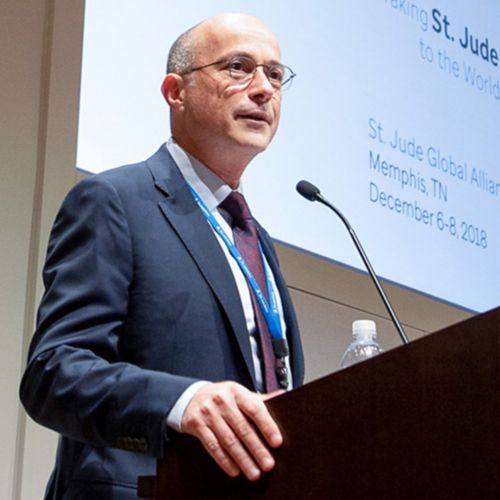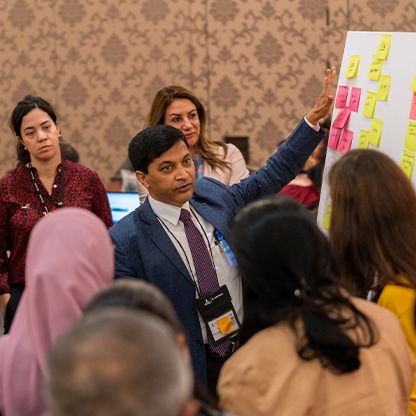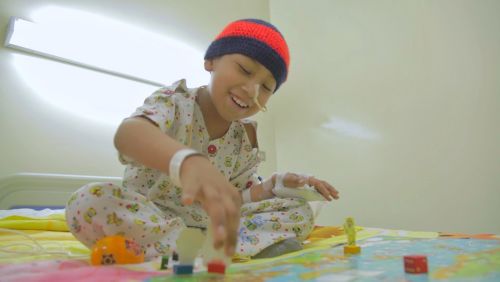St. Jude Family of Websites
Explore our cutting edge research, world-class patient care, career opportunities and more.
St. Jude Children's Research Hospital Home

- Fundraising
St. Jude Family of Websites
Explore our cutting edge research, world-class patient care, career opportunities and more.
St. Jude Children's Research Hospital Home

- Fundraising
Central and South America Regional Program
Other Regional Programs:
The St. Jude Global Central and South America Regional Program (CASA) started in 2016, but was founded on an existing network of collaboration with active projects in the region dating to 1993.
These established St. Jude partnerships extended throughout Central America, the Dominican Republic, Haiti, Ecuador, Chile, Venezuela and Brazil. These programs aimed to support capacity building to improve the level of care for children with cancer. Today, the CASA program formally collaborates with more than 60 Alliance members, spread across 18 countries.
The global work of St. Jude has its roots in the Central and South America region, where in 1993 the institution established its first global program at Benjamin Bloom Hospital in El Salvador. After just three years of the twinning program between St. Jude and Benjamin Bloom, the survival rate of children with acute lymphoblastic leukemia (ALL) in the country rose from near zero to 50%. This work led to the creation of the St. Jude International Outreach Program, which today is St. Jude Global. In 1996, St. Jude established such a program in Guatemala, and later in Honduras, Nicaragua, the Dominican Republic and Haiti.
These collaborative relationships helped bring together institutions from Nicaragua, Guatemala, Honduras, El Salvador and Costa Rica in 1998 to form the Asociación de Hemato-Oncología Pediátrica de Centro América (AHOPCA). This network takes a regional approach to the development of adapted treatment guidelines that, once finalized, are shared across borders and throughout the region. Today, AHOPCA also includes institutions from the Dominican Republic, Haiti and Panama. In addition to AHOPCA, St. Jude played an important role in collaborating with regional partners to develop the Consorcio Latinoamericano de Enfermedades Hemato-Oncológicas Pediátricas (CLEHOP), a consortium for the development of stratified adapted treatment guidelines and clinical protocols, and the Grupo América Latina de Oncología Pediátrica (GALOP), a collaboration with Children's Oncology Group to run common protocols.
Regional Initiatives
Since its inception, the CASA program has focused on:
- Building local and regional networks of collaboration.
- Facilitating access to St. Jude Global resources.
- Working with pediatric oncologists and key stakeholders to strengthen local health systems.
Ongoing initiatives include strengthening collaborations with institutions and cooperative groups to improve care, facilitating engagement of St. Jude Global Alliance members, and supporting the implementation of the Global Initiative for Childhood Cancer with technical expertise and assistance for the development of national childhood cancer plans.
Latin America Regional Advisory Committee
On June 12, 2021, the Central and South America and Mexico regional programs joined forces to create a single Regional Advisory Committee for Latin America (RAC LATAM) to represent and serve the region, supporting its interests with a single voice in the Global Alliance. The RAC LATAM aims to identify the region’s needs and priorities, inform resource procurement and distribution and optimize lines of work or projects by representing Alliance members and key consortia.
Regional Engagements
Brazil
St. Jude and Brazil have a longstanding relationship, from support for the pediatric oncology unit at Instituto de Medicina Integral Professor Fernando Figueira in Recife under the previous International Outreach Program as well as a fellowship program with Hospital de Câncer Infantojuvenil de Barretos.
In 2019, the CASA program supported two national workshops. The first one, in Recife, brought together 20 institutions, state health representatives and pediatric cancer stakeholders to locally design initiatives. The second, held in Barretos, laid one of the foundation stones of AMARTE Alliance, a collaborative national network of pediatric oncology units from different regions, which had the shared purpose of improving access and quality of care. In 2021, AMARTE implemented the Pediatric Oncology Facility Integrated Local Evaluation (PrOFILE) tool to identify the group’s priorities. Today, the network includes more than 25 hospitals. Its structure promotes the collaboration between and across disciplines, serving also as a model for implementing national initiatives.
Since 2021, Brazil has been a focus country in the Global Initiative for Childhood Cancer. Together with PAHO, Instituto Desiderata, local hospitals and health authorities, we are working to expand the project Unidos Pela Cura in the state of Pernambuco. Developed by Desiderata, Unidos Pela Cura promotes early diagnosis by streamlining and monitoring the referral of pediatric patients.
Chile
St. Jude began its collaboration in Chile in the 1990s through collaboration with Hospital Calvo Mackenna. The partnership established a bone marrow transplant program, one of only two American Society of Hematology (ASH)-designated training centers for pediatric bone marrow transplantation in Latin America, and also developed a nurse educator training program.
Childhood cancer services in Chile have been delivered by the Programa Infantil para Drogas Antineoplásicas (PINDA) since 1988. The program includes 20 pediatric hematology and oncology (PHO) centers. In 2020, as the collaboration with Chile grew, CASA, in collaboration with the Metrics and Performance Unit, launched the implementation of the Pediatric Oncology Facility Integrated Local Evaluation (PrOFILE) tool in 16 PINDA network facilities in Chile. This launch helped illustrate the region’s PHO landscape; to systematically assess the role of nonbiological factors, such as context, facility infrastructure, service capacity, diagnostic and therapeutic capabilities, and communication on childhood cancer outcomes; and guide conversations on how to address these factors collaboratively.
With the help of the PrOFILE dynamic 360-degree evaluation of Chilean health services, PINDA centers and stakeholders defined priorities and designed an improvement strategy for the next three years. In addition, the PrOFILE results helped development of the Chilean National Childhood Cancer Plan.
Implementing the WHO Global Initiative for Childhood Cancer in Latin America and the Caribbean
As a WHO Collaborating Centre for Childhood Cancer, St. Jude serves as the lead implementation partner for the Global Initiative for Childhood Cancer, launched in partnership with WHO in 2018. The collaborative effort brings together stakeholders from around the world with the shared goal of increasing the childhood cancer survival rate to 60% by 2030 and reducing suffering for all.
Peru was the first country to join the global initiative — in 2019. Nearly 1,800 children and adolescents are diagnosed with cancer every year in Peru. These diagnoses are often late, meaning up to 70% of patients already have advanced, often metastatic, disease when diagnosed, and approximately half will die.
To launch the Global Initiative for Childhood Cancer in Peru, St. Jude Global, WHO and the Ministry of Health of Peru hosted the first Peru National Stakeholder Workshop on Childhood Cancer in June 2019 in Lima. Workshop participants identified initiatives to strengthen the health system in alignment with a national childhood cancer plan. This resulted in the enactment of Peru’s first Childhood Cancer Law in September 2020.
Today, more than 20 countries in Latin America and the Caribbean engage with activities from the Global Initiative for Childhood Cancer.
Nursing
Collaboration between the St. Jude Global Nursing Program and institutions across Central and South America has led to many valuable educational and capacity-building opportunities, including:
- Training pediatric oncology nurse educators through a revamped online version of the Latin American Pediatric Oncology Nursing Education Program, which provides a yearlong training curriculum for nurse educators working in resource-limited settings.
- Supporting the Latin American Nurse Educator Network.
- Promoting standardized chemotherapy/biotherapy certificate education for nurses in the region, in partnership with the Association of Pediatric Hematology/Oncology Nurses (APHON).
- Supporting improvements in nursing care through joint development and utilization of the Improving Pediatric Oncolo-Hematology Nursing (ICON) tool, starting in Brazil.
Our Team
-
View Details
Paola Friedrich, MD, MPH
Associate Member, St. Jude Faculty
Director, Mexico Region, St. Jude Global
Paola Friedrich, MD, MPH
Associate Member, St. Jude Faculty
Director, Mexico Region, St. Jude Global
Affiliations
Research Interests
- Omproving childhood cancer outcomes in low-and middle-income countries through focus on metrics, health systems, and priority-setting
- Developing resource-level tiered systems in global pediatric oncology, resembling the well-established neonatal intensive care and trauma center levels
- Determining the role of social determinants of health as drivers of outcome disparities between populations in order to identify and address them
- Optimizing treatment for children, adolescents and young adults with solid tumors
Contact Information
Paola Friedrich, MD, MPH
Global Pediatric Medicine
MS 721, Room L1600.15
St. Jude Children's Research Hospital
262 Danny Thomas Place
Memphis, TN 38105-3678
-
View Details
Marta Jarquin-Pardo, PhD
Program Manager, Central and South America Regions
Affiliations
Short Biography
Marta serves as a Project Coordinator for the initiatives in Central and South America. Before joining St. Jude Global Marta worked in the Human Resources Department as a Scientific Recruiter. Marta graduated with a Bachelor’s of Science in Chemistry from the University of Costa Rica and a PhD in Biochemistry and Molecular Biology from LSU Health Sciences Center. After completing her PhD Marta completed 2 years of post-doctoral training in Virology. She is originally from Costa Rica and is fluent in Spanish.
Contact Information
Marta Jarquin-Pardo, PhD
Global Pediatric Medicine
St. Jude Children's Research Hospital
262 Danny Thomas Place
Memphis, TN 38105-3678
-
View Details
Amalia Valdes
Program Manager, Central and South America Region
Affiliations
Short Biography
Amalia Valdes is the Program Manager for the Central and South America Regional Program in Global Pediatric Medicine. She promotes networks of collaboration with the consortia in the region, developing the Regional Advisory Committee, working on performance improvement initiatives for quality improvement, and facilitating access to global resources. Amalia is a native of Bogotá, Colombia.
Prior to coming to St. Jude, Amalia was the Business Operations Manager for the Center for Information and Analytics at Regional One Health. She has a bachelor’s degree in economics and master’s degrees in economic theory and health care administration. She is a Lean Six Sigma Green Belt certified by the American Society of Quality (ASQ). She has more than 10 years of experience in finance and marketing in the banking industry.
When not working, Amalia devotes her time to her family, which includes her husband and two children. She believes time with family is the best investment that one can make as it has the highest return. She is passionate about helping underserved communities, especially vulnerable children and elderly populations. Also, she enjoys traveling abroad and learning new cultures.
Contact Information
Amalia Valdes
St. Jude Children's Research Hospital
262 Danny Thomas Place
Memphis, TN 38105-3678
-
View Details
Patricia Loggetto, MPP
Project Coordinator, Central and South America Regional Program
Patricia Loggetto, MPP
Project Coordinator, Central and South America Regional Program
Affiliations
Contact Information
Patricia Loggetto, MPP
St. Jude Global
St. Jude Childen's Research Hospital
262 Danny Thomas Place
Memphis, TN 38105-3678










